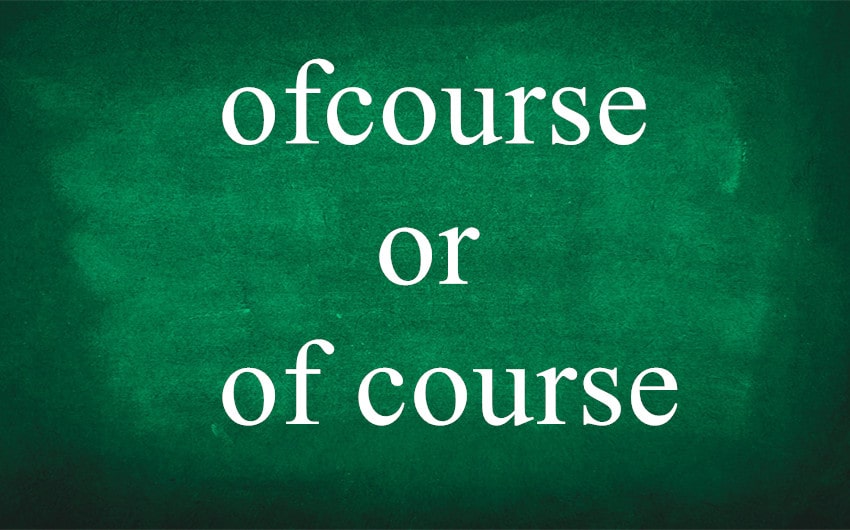Ofcourse or Of Course: Which is the Correct Spelling?
Have you ever wondered whether to use “ofcourse” or “of course” in your writing? This common confusion can trip up even the best writers. Understanding the correct usage is important for clear communication and avoiding embarrassing mistakes.
Whether you’re texting a friend, writing an email, or crafting a professional document, knowing the difference can make a big impact. In this article, we’ll explore the proper spelling and usage of “of course,” helping you ensure your writing is always polished and correct.
Understanding the Correct Usage
The confusion between “ofcourse” and “of course” is widespread, but it is essential to recognize that only one of these forms is correct. The phrase “of course” is used to express agreement, certainty, or obviousness in response to a question or statement.
Explanation of “of course” as the Correct Form:
- Two Separate Words: “Of course” is a compound phrase consisting of the preposition “of” and the noun “course.” The phrase historically stems from the concept of something happening as a matter of course, meaning it is expected or natural. This etymological background underscores why “of course” is the only grammatically correct form.
- Meaning and Usage: The phrase “of course” is employed to indicate that something is self-evident, expected, or naturally understood. It serves to affirm or agree with what someone else has stated. For example, “Of course, you can borrow my book,” or “Are you attending the meeting? Of course, I am!”
Breakdown of the Phrase “of course” and Its Meaning:
- “Of”: The preposition “of” is used to denote a relationship or connection between two elements. In this phrase, it connects the concept of an expected action or situation to its natural occurrence.
- “Course”: The noun “course” refers to the regular or anticipated progression of events. When combined with “of,” it conveys the notion that the action or situation is following the expected or natural path. The term “course” in this context is derived from the Old French “cours,” meaning “a run” or “a flow,” which implies a natural progression.
Common Reasons for Incorrect Usage

The phrase “of course” is often mistakenly written as “ofcourse,” leading to confusion and errors in written communication. Several factors contribute to this common misconception. Understanding these reasons can help avoid such mistakes and ensure proper usage. Here’s a detailed look at why “ofcourse” is often incorrectly used and the underlying misconceptions:
1. Influence of Quick Typing and Autocorrect Errors:
In today’s fast-paced digital world, people often type quickly, aiming to convey messages as swiftly as possible. This rapid typing can lead to the accidental merging of “of” and “course” into “ofcourse.” The mistake is particularly common in informal contexts like texting and instant messaging where speed often takes precedence over accuracy.
Additionally, many mobile devices and word processing software have autocorrect features that attempt to predict and correct words as they are typed. Unfortunately, autocorrect can sometimes misinterpret the user’s intention, either failing to separate “of” and “course” or not recognizing “ofcourse” as incorrect. This can reinforce the incorrect usage over time.
2. Lack of Familiarity with Correct Spelling:
Individuals who primarily write in informal settings, such as social media, texting, or casual emails, may not be as familiar with formal grammar rules. Without frequent exposure to the correct usage in more structured contexts, the error can become ingrained.
Moreover, not everyone receives thorough instruction in grammar and spelling during their education. This gap can lead to a lack of awareness about the correct form of common phrases, including “of course.” Consequently, people might continue to use “ofcourse” without realizing it is incorrect.
3. Visual Similarity and Phonetic Ambiguity:
The visual similarity between “of” and “course” can lead to their unintentional merging. When glanced at quickly, “ofcourse” might not immediately appear incorrect to the untrained eye, especially in the flow of reading or writing rapidly.
Additionally, when spoken aloud, “of course” is pronounced fluidly, without a significant pause between the words. This seamless pronunciation can create a phonetic ambiguity, leading individuals to believe that “ofcourse” might be a single word. This phonetic blending can further perpetuate the mistake in both written and spoken communication.
4. Influence of Non-Native English Speakers:
Non-native English speakers might encounter difficulties with the nuances of English grammar and spelling. The phrase “of course” might not have a direct equivalent in their native language, leading to confusion about its proper form in English. In some cases, non-native speakers might rely on learning materials or online resources that contain errors.
Exposure to incorrect usage can perpetuate the mistake, especially if it goes unchecked by knowledgeable instructors or peers. This challenge underscores the importance of accurate language resources and guidance for those learning English as a second language.
5. Informal Writing Trends:
The rise of online communication has introduced a more casual approach to writing, where strict adherence to grammar and spelling rules is often relaxed. This informality can foster the use of incorrect forms like “ofcourse,” particularly on platforms where brevity and speed are prioritized.
Social media, in particular, encourages rapid exchanges and often overlooks minor grammatical errors, which can normalize the use of “ofcourse.” The frequent appearance of this incorrect form in posts, comments, and messages can make it seem acceptable, even though it deviates from standard usage.
6. Cultural and Regional Variations:
In certain regions or communities, local usage patterns might favor informal or colloquial spellings that deviate from standard English. Exposure to such variations can influence individuals to adopt incorrect forms like “ofcourse” without realizing it.
Different English dialects might have unique conventions and informal norms that impact how phrases are written and understood. While “ofcourse” is not standard in any recognized dialect, dialectal influences can still contribute to the misconception. Awareness of these regional and cultural nuances is essential for maintaining clarity and correctness in broader communication contexts.
Historical Context

Understanding the historical context of the phrase “of course” can provide valuable insights into its correct usage and why it has evolved the way it has. The phrase “of course” has a rich linguistic background, reflecting its development through centuries of English language usage. Here’s a chronological look into the historical origins and evolution of this commonly used phrase:
Origins of the Phrase:
Etymology: The phrase “of course” comes from the Old French term “cours,” which means “run” or “flow,” and from the Latin “cursus,” meaning “course” or “a running.” The preposition “of” in English, which denotes a relationship between parts, combines with “course” to form a phrase that literally means “as a matter of natural course.”
Early Usage: In Middle English (circa 1150-1500), the term “course” was used to describe the natural order of things or a path taken. The combination “of course” began to emerge in English texts to indicate something that follows the expected or natural order.
17th Century:
The phrase “of course” started to be used more frequently in English literature and correspondence. It was used to express the idea that something was natural or expected. For example, in the 1600s, one might read in a text, “It follows, of course, that the sun rises in the east.” This usage reflects the growing standardization of the English language and the formalization of common phrases.
18th Century:
By the 18th century, “of course” had become a common phrase in both spoken and written English. It was used to confirm or assert that something was obvious or should be naturally understood. Literature from this period shows an increasing use of the phrase in everyday dialogue and descriptive writing, reflecting its integration into the common vernacular.
19th Century:
In the 19th century, the phrase “of course” solidified its place in modern English. Authors like Jane Austen and Charles Dickens used it in their works to add realism to dialogue and to convey characters’ certainty or agreement. Its presence in classic literature helped cement its usage in everyday language, ensuring that it became a staple phrase for expressing obviousness and natural progression.
20th Century:
The 20th century saw the continued use and reinforcement of “of course” in both formal and informal contexts. As English became a global lingua franca, the phrase was adopted by many non-native speakers, maintaining its meaning and usage across different cultures.
The transition from print to digital communication also affected the frequency and context in which “of course” is used, adapting to new mediums like emails and social media while retaining its core meaning.
Modern Usage:
In the 21st century, “of course” remains a ubiquitous part of English communication, used across various contexts and mediums. It is a standard way to express certainty, agreement, or the naturalness of a situation. Whether in everyday conversations, professional settings, or written communication, “of course” continues to convey clarity and assurance.
Examples in Sentences

Using “of course” correctly in sentences can enhance clarity and ensure effective communication. Below are examples that demonstrate proper usage in various contexts, along with explanations to illustrate why “of course” is appropriate in each instance.
1. Affirmation and Agreement:
- Example: “Can you help me with my homework?” “Of course, I’d be happy to help.”
- Explanation: In this example, “of course” is used to affirm the willingness to assist, indicating that helping with the homework is expected and natural.
- Example: “Did you enjoy the movie?” “Of course, it was fantastic!”
- Explanation: Here, “of course” expresses enthusiastic agreement, reinforcing that enjoying the movie was a given.
2. Conveying Obviousness:
- Example: “Of course, the Earth orbits the Sun.”
- Explanation: This sentence uses “of course” to state a well-known fact, emphasizing that the information is common knowledge and should be naturally understood.
- Example: “Of course, you need a password to access your account.”
- Explanation: “Of course” is used to highlight the obvious necessity of having a password for account security, something that should be inherently understood by the listener.
3. Politeness and Reassurance:
- Example: “Can I ask you a question?” “Of course, ask away.”
- Explanation: The use of “of course” here adds a polite and welcoming tone, reassuring the person that asking a question is perfectly acceptable.
- Example: “Is it okay if I borrow your book?” “Of course, take your time with it.”
- Explanation: “Of course” is used to reassure the person that borrowing the book is no problem at all, conveying a friendly and accommodating attitude.
4. Professional and Formal Contexts:
- Example: “Will the report be ready by Friday?” “Of course, we will ensure it is completed on time.”
- Explanation: In a professional setting, “of course” confirms commitment and reliability, assuring the requester that the deadline will be met.
- Example: “Are you familiar with the new company policy?” “Of course, I reviewed it yesterday.”
- Explanation: This usage demonstrates awareness and diligence in a workplace context, indicating that being up-to-date with policies is expected and routine.
5. Expressing Certainty:
- Example: “Are you going to the meeting?” “Of course, I never miss important meetings.”
- Explanation: “Of course” is used to express certainty and routine behavior, emphasizing that attending important meetings is standard practice.
- Example: “Will you be presenting at the conference?” “Of course, I’ve already prepared my presentation.”
- Explanation: This response uses “of course” to convey confidence and preparedness, indicating that presenting at the conference is a foregone conclusion.
6. Informal Conversations:
- Example: “Do you want to grab lunch together?” “Of course, I was just about to suggest the same.”
- Explanation: In casual dialogue, “of course” shows enthusiastic agreement and alignment of thoughts, making the conversation flow naturally.
- Example: “Did you see the latest episode?” “Of course, I couldn’t miss it!”
- Explanation: Here, “of course” indicates excitement and an obvious interest in the subject, emphasizing that watching the episode was a priority.







